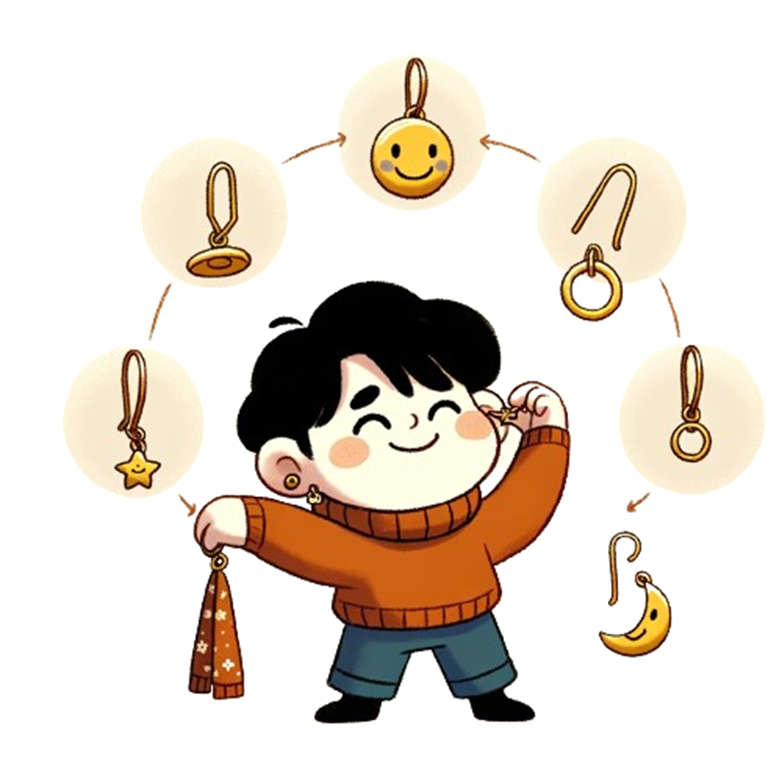Contents
- ▶ 속담의 설명 (Proverb Explanation)
- ▶ 속담 마무리(Conclusion)
” 이번 정책이 너무 줏대가 없어. 귀에 걸면 귀걸이, 코에 걸면 코걸이 같아. “
” This policy is so standardless. It’s like ‘ 귀에 걸면 귀걸이, 코에 걸면 코걸이 ‘ “

▶ 속담의 설명 (Proverb Explanation)
1. 속담 직역 (Proverb Literal translation) ▷▶ If it’s hung on the ear, it’s an earring; if it’s hung on the nose, it’s a nose ring.
2. 속담 의미 요약 (Proverb Summary)
• This proverb implies that something can be interpreted or used in different ways depending on the situation or perspective. It suggests that there are no fixed principles, and things can be twisted or adapted as needed.
3. 유사 속담 (Similar Proverb)
• One man's trash is another man's treasure.
4. 속담 상세 정보 (Detail Information of Proverb)
“귀에 걸면 귀걸이, 코에 걸면 코걸이”라는 속담은 상황이나 관점에 따라 동일한 것이 다르게 해석되거나 사용될 수 있다는 것을 의미합니다.
이 속담은 일정한 원칙이 없이 상황에 따라 또는 사람들의 관점에 따라 사물이나 개념이 이렇게도 될 수 있고 저렇게도 될 수 있음을 나타냅니다.
이는 객관적인 표준이나 기준 없이 사물이나 상황이 유동적으로 해석될 수 있는 상대주의적인 관점을 반영합니다.
The Korean proverb “귀에 걸면 귀걸이, 코에 걸면 코걸이,” which translates to “If it’s hung on the ear, it’s an earring; if it’s hung on the nose, it’s a nose ring,” suggests that the same object or concept can be interpreted or utilized differently depending on the situation or perspective.
It implies that without fixed principles, things can be twisted or adapted as per the circumstances or individual viewpoints.
This saying reflects a relativistic view where objects or situations can be interpreted flexibly without objective standards or criteria.
속담 예시(proverb example) 1)
- 상황: 한 팀에서 같은 데이터를 가지고 두 가지 전혀 다른 결론을 도출했습니다.
- Situation: A team derives two completely different conclusions from the same data.
- 사용: “같은 데이터라도 해석은 다를 수 있어요. 이것이 바로 ‘귀에 걸면 귀걸이, 코에 걸면 코걸이’의 예입니다.”
- Usage: “Even with the same data, interpretations can vary. This is a perfect example of ‘if it’s hung on the ear, it’s an earring; if it’s hung on the nose, it’s a nose ring.'”
속담 예시(proverb example) 2)
- 상황: 한 상황이나 발언이 서로 다른 사람들에게 각각 다른 의미를 가집니다.
- Situation: A particular situation or statement means different things to different people.
- 사용: “그녀는 새로운 것을 배우는 것이 어렵다고 생각해서 시도조차 하지 않았어요. 이것이 바로 ‘구더기 무서워 장 못 담글까’입니다.”
- Usage: “이 상황은 사람마다 다르게 받아들여집니다. ‘귀에 걸면 귀걸이, 코에 걸면 코걸이’처럼 말이죠.”
5. 속담 속 오늘의 단어(Vocabulary in Proverb)
| 오늘의 단어 | |
| 귀 | ear |
| 코 | nose |
| 걸다 | hang on |
| 데이터 | date |
| 전혀 | completely |
| 결론 | conclusion |
| 도출하다 | derive |
| 상황 | situation |
| 발언 | statement |
▶ 속담 마무리(Conclusion)
The proverb “If it’s hung on the ear, it’s an earring; if it’s hung on the nose, it’s a nose ring” illustrates the idea that the same object or concept can have different meanings or uses depending on how it’s interpreted or in what context it’s placed.
It highlights the relativistic nature of perception, where things can be seen in multiple ways based on individual perspectives or situational contexts.
This saying is a reminder of the subjectivity inherent in interpretation and the versatility of objects or ideas when viewed from different angles.
May this proverb inspire you to recognize the diversity of perspectives and the flexibility in interpretation.
It’s a call to acknowledge that there are multiple ways to view and understand the world around us, and what may be one thing in a certain context could be something entirely different in another.
‘귀에 걸면 귀걸이, 코에 걸면 코걸이’라는 속담은 같은 대상이나 개념이 해석 방식이나 맥락에 따라 다른 의미나 용도를 가질 수 있음을 보여줍니다.
이는 인식의 상대주의적인 본성을 강조하며, 개인적인 관점이나 상황에 따라 다양한 방식으로 볼 수 있는 것들을 상기시킵니다.
이 속담은 해석에 내재된 주관성과 다양한 각도에서 바라볼 때 대상이나 아이디어의 다재다능함을 일깨워줍니다.
이 속담이 여러분에게 관점의 다양성과 해석의 유연성을 인식하게 하는 데 영감을 주길 바랍니다.
우리가 살아가는 세상을 바라보고 이해하는 방법에는 여러 가지가 있으며, 어떤 맥락에서는 하나의 것이 다른 맥락에서는 전혀 다른 것이 될 수 있다는 것을 인정하는 것이 중요합니다.
녹음 된 소리를 들으면서 공부하기 (추후 제공 예정)
이 곳은 향후에 해당 속담 포스팅의 한글을 원어민이 읽어주는 녹음본이 게시될 예정입니다. 여러분들의 한국어 공부에 도움이 되고자 노력 중이니 잠시만 기다려주세요. 감사합니다. This space will soon feature a recording of the post being read by a native speaker in Korean. We are working hard to assist with your Korean studies, so please stay tuned. Thank you. 이 곳은 향후에 해당 속담 포스팅의 한글을 원어민이 읽어주는 녹음본이 게시될 예정입니다. 여러분들의 한국어 공부에 도움이 되고자 노력 중이니 잠시만 기다려주세요. 감사합니다. This space will soon feature a recording of the post being read by a native speaker in Korean. We are working hard to assist with your Korean studies, so please stay tuned. Thank you.
다른 속담 링크
속담(42) – 고기는 씹어야 맛이요, 말은 해야 맛이라.